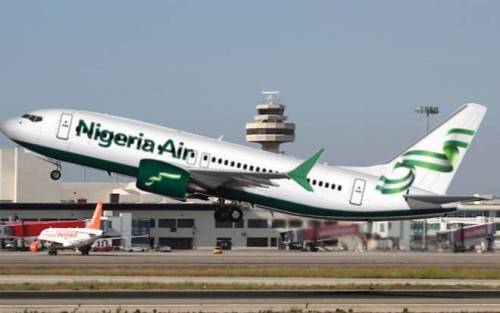Aviation
Why airlines fail in Nigeria, by experts
Published
7 years agoon
By
Olu Emmanuel
Experts in the aviation sector have adduced reasons why carriers have short life span listing absence of corporate governance principles by their owners and managers; poor business plan; lack of technical knowledge of the industry as well as unsuitability of aircraft type.
The experts including Former Director of Human Resources , Virgin Nigeria Airways and Director General Institute of Directors (IOD), Mr Victor Banjo; Former Managing Director of AeroContractors and Air Nigeria, Captain Dapo Olumide ; President of Aviation Roundtable, Mt Gbenga Olowo ; and Chief Executive Officer , Overland Airways , Captain Edward Boyo said many carriers failed in Nigeria because their owners failed to adhere to the code of corporate governance and other factors that has increased the bust and boom circle of airlines.
Speaking the Quarter 4 2018 Business Breakfast Meeting of Aviation Roundtable in Lagos, Banjo who was the guest speaker, while delivering a paper entitled : ” Short Life Span of Nigerian Airlines : Importance of Corporate Governance”, Banjo said many carriers failed because of absence of professional management; absence of internal audit; government interference and lack of protection of whistle blowers.
According to him, Corporate Governance provides the controls and discipline operators need and that adoption of corporate governance practices promote effective leadership and corporate sustainability.
Adding that controls and discipline can moderate the desire for excessive profit which leads to unethical practices and fraudulent acts, Banjo said “Good corporate governance thrives when you have a rationalized policy determination process. This is only achievable when we have clear sighted political leaders who are committed to the development of Nigeria as opposed to sectional and parochial interests. Ethiopia, Namibia, Rwanda, Cote D’Ivoire, Togo, Ghana and Senegal are getting it right in terms of airline management and airport infrastructure, as with other areas of human endeavour. What is stopping us?”.
He said for any carrier to succeed, its managers and promoters must adhere to the four pillars of corporate governance; which include : accountability, fairness, transparency and independence.
He berated the industry regulator : Nigerian Civil Aviation Authority (NCAA), for its failure to whip domestic carriers in line with the provisions of corporate governance as contained in the Nigerian Cil Aviation Regulations ( NCAR), of 2006.
He said : ” NCAA is part of the problem. The regulator has failed in its duty of ensuring that airlines implement good corporate governance in their operations.”
He said the controversial national carrier : Nigeria Air failed because the Minister of State, Aviation, Hadi Sirika failed because the minister did not adhere to the code of corporate governance.
Banjo said : ” Sirika did not adhere to the code of corporate governance . A board of directors was supposed to run the airline and not the minister of aviation. The project failed simply because there was no structure in place for the national carrier to fly. Sirika should have put in place a professional team.
On his part, Olumide said many carriers failed in the past due to poor business planning; wrong financial models; non involvement of people with intrinsic knowledge of the industry ; inability of operators to use fuel efficient aircraft and high airport charges.
Olumide said : ” Airlines have failed in Nigeria because operators need to use brand new airplanes, which in the long term reduces cost of maintenance, poor credit rating of Nigeria and other factors.
” For airlines to survive, operators need to invest more in manpower development, explore international windows for aircraft financing by looking at a twenty year financing model , exploring export credit agencies guaranteed loans and take advantage of open skies agreements, which stimulates competition and improves service levels.”
On his part, Boyo said besides adhering to good corporate governance principles operators need to operate in a good business environment .
Boyo said passengers were not paying as air fare, saying airlines were being over regulated by the NCAA.
He said “Airlines suffer from over regulation by the NCAA. Many airlines are struggling not because of factors caused by them, but because of the operating environment. ”
In his remark, Chairman of the occasion and Director of Studies, Centre for International Advanced and Professional Studies, Prof. Anthony Kila said that Nigeria Air was conceived on power point, shared on Adobe and died on Twitter”.
According to Kila, the Nigeria Air project was embarked on without due consultation and communication with people that matters, adding that there was no industry engagement and when a project is done like that it is bound to die.
President of Aviation Roundtable (ART) Elder Gbenga Olowo who set the ball rolling at the event said the think-tank believes the announcement to bring back the national carrier was a vote of no confidence on the existing airlines.
Olowo said, “The announcement of Nigeria Air in the last three years of President Buhari shook the industry. That announcement was a vote of no confidence on the sector; that the Airlines that are existing are not doing well. ‘We are going to float another airline’. “And three years after we suddenly learnt that project is being suspended and that made all of us to start speculating why, how, what happened and we will continue to speculate until we hear exactly what happened. I will say that it destabilizes the sector because in planning with the Nigerian Airlines in the last three years, they would factor in that announcement. If I were to be the MD of a Nigerian airline, I would factor in the arrival of a very strong competitor”.
Olowo challenged the federal government to come out and tell Nigerians whether the project was only suspended or it would be resuscitated. Project Nigeria Air was suspended in September after a Federal Executive Council (FEC) meeting where no actual reasons for the suspension has been given, other than statements from Ministries of State, Aviation negating its counterpart in information, culture and Tourism claims about investors not forth coming.
Olowo equally advised the Airline Operators of Nigeria (AON) to go and pursue the Fly Nigeria Act so as to increase their revenue generation.
“AON should go and put up the Flight Nigeria Act Bill so as to make gains. Your costs are so much and you can’t control them. The only way is to increase your revenue by pursuing the Fly Nigeria Act”, Olowo said”
In his views, Capt John Ojikutu said Nigeria does not understand the structure of national carrier, stressing that Nigeria Airways was not a national carrier but a government carrier.
Ojikutu emphasized that “we told them not to set up government airline, that they should call private operators to work with them”.
To another aviation consultant and MD/CEO Belujane Konsult Limited, Chris Aligbe, hope is bleak with the suspension of Nigeria Air.
“Hope is bleak if we don’t have national carrier. The question is not ego but what is the future of our children. We are also looking at what we going to provide for them. The problem with Nigeria Air is poor communication management. I don’t think Nigeria Air is dead; it is not dead.”
Trending

 Latest1 week ago
Latest1 week agoPublic school building collapses in Ikorodu as students attend classes

 Business1 week ago
Business1 week agoLIRS sets January 31, 2026 deadline for employers’ 2025 annual tax returns

 Latest1 week ago
Latest1 week agoLagos govt confirms no casualties at Lagos secondary school building collapse

 Latest1 week ago
Latest1 week agoEtiebet hails Akpabio–Umo Eno alliance, describes APC synergy in Akwa Ibom as unprecedented

 Business1 week ago
Business1 week agoSEC unveils sweeping capital overhaul, raises minimum requirements across capital market

 Business1 week ago
Business1 week agoNGX ends 23-session rally as profit-taking wipes N457bn off investors’ portfolios

 Football1 week ago
Football1 week agoSlot hails Salah’s return as Liverpool prepares for Burnley clash

 Business1 week ago
Business1 week agoComrade Izeze, Foostodey boost youth entrepreneurship in Ughelli Sout

